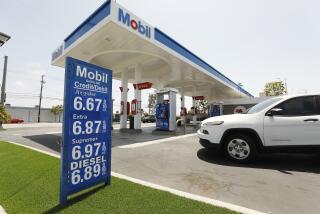Your Could Be Filling Your Car With Junk
- Share via
What does your car’s engine have to do with Russian organized crime? If you are a gasoline consumer in Los Angeles, the answer will come in handy the next time your car’s engine is fouled.
At a recent Senate hearing, federal investigators testified that Russian mobsters have penetrated deeply into the motor fuel industry in Southern California, executing a wide range of scams to bilk consumers with contaminated fuel and the government out of federal excise taxes.
One of the scams is to mix contaminants into virgin gasoline, thereby netting a profit of up to 50 cents per gallon on the taxes and on the low-cost filler. The Russian groups, which include ethnic Russians, Armenians and Ukrainians, own huge networks of gas stations.
“Good fuel is blended with non-taxed products such as kerosene, waste oil, tranmix [a mixture of kerosene and gasoline], toxic waste and other products into a mixture called cocktail fuel,” said Edward L. Federico Jr., director of national operations for criminal investigations at the Internal Revenue Service.
Not only are consumers and the government cheated, but the practice raises huge environmental risks and poses serious threats to automobile fuel systems. “Criminals are selling these substandard and dangerous products to unsuspecting retail dealers and motorists in many parts of the country,” Federico said at a hearing of the Senate permanent subcommittee on investigations. “This junk is clogging engines and even worse, it is polluting our air.”
Los Angeles motorists are particularly susceptible to the problem because the city has become one of two operating hubs for Russian organized crime groups. Fuel scams have become their signature crime and by some estimates are cheating the government out of $1 billion annually nationwide.
Linda Bryant, a Russian mob expert with the state Justice Department, added in an interview that fuel tampering in Los Angeles “is a widespread problem.”
The mobs insulate themselves from investigators by creating complex paper trails--called daisy chains--that make tracing the fuel from refinery to gas station difficult or impossible. In 1995, 15 members of these Los Angeles mobs were indicted on federal charges that included a lengthy list of activities in addition to fuel tax scams: extortion, drug dealing and procurement of prostitutes from the former Soviet Union.
At the Senate hearing, Federico held up a bottle of brown liquid that federal authorities refer to as “junk fuel.” But motorists shopping for gas probably would have little luck discerning good fuel from bad fuel by its color. Although brand-name gasoline is subject to tampering, Bryant said the problem of contaminated fuels is most severe at independent stations that sell unbranded gas.
Federal experts advise that there is only one basic step consumers can take to avoid becoming a victim of dirty gasoline: Once you find a reputable gas station, stick with it.
The government, including officials from defense, environmental and law enforcement organizations, is working on high-tech testing methods to identify the bad fuel. Until then, watch out.
* Vartabedian cannot answer mail personally but will attempt to respond in this column to automotive questions of general interest. Do not telephone. Write to Your Wheels, 1875 I St. N.W. #1100, Washington, DC 20006 or e-mail to Ralph.Vartabedian@LATIMES.COM.







